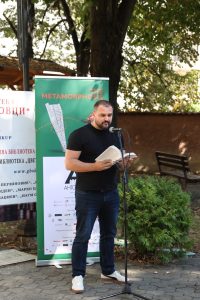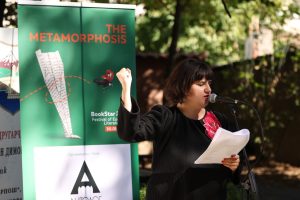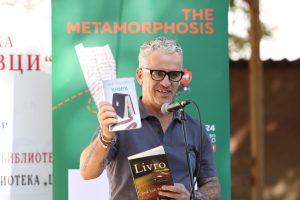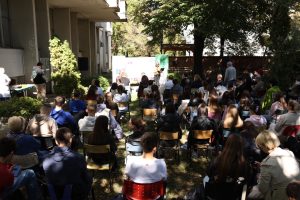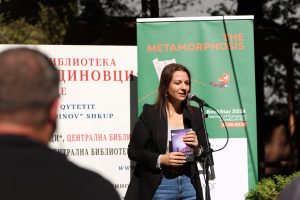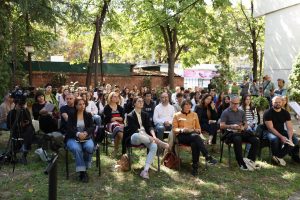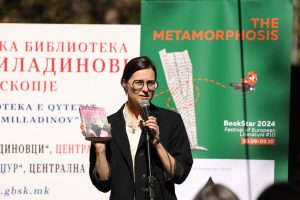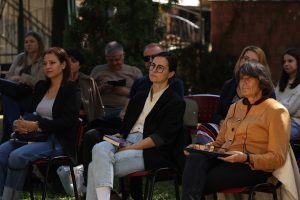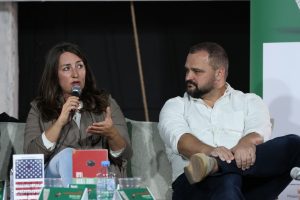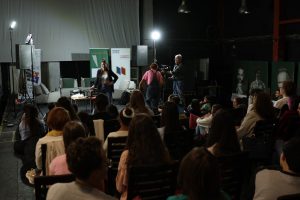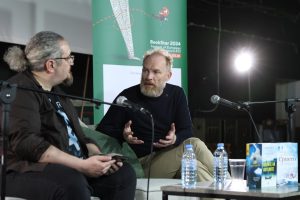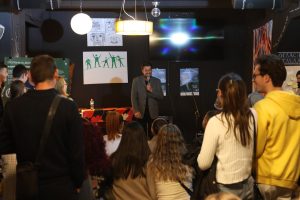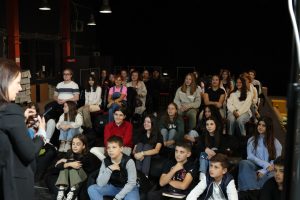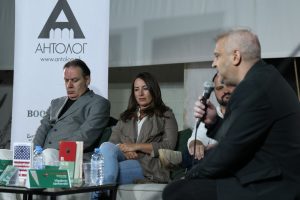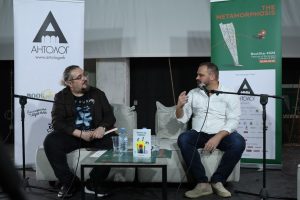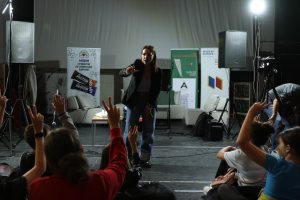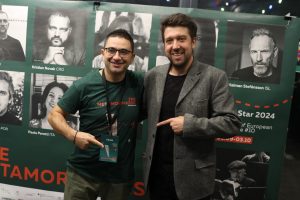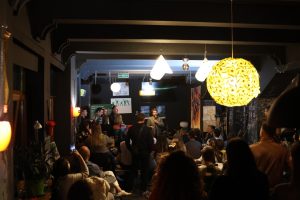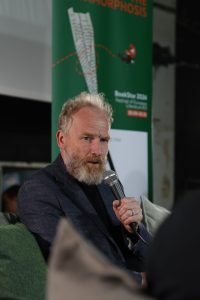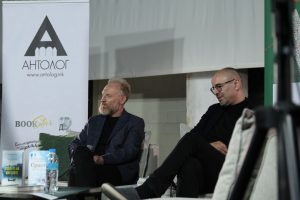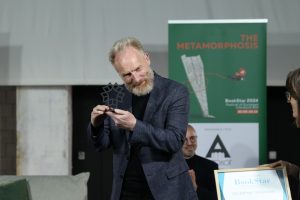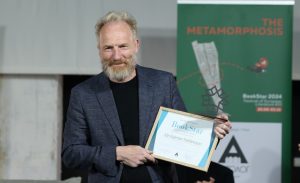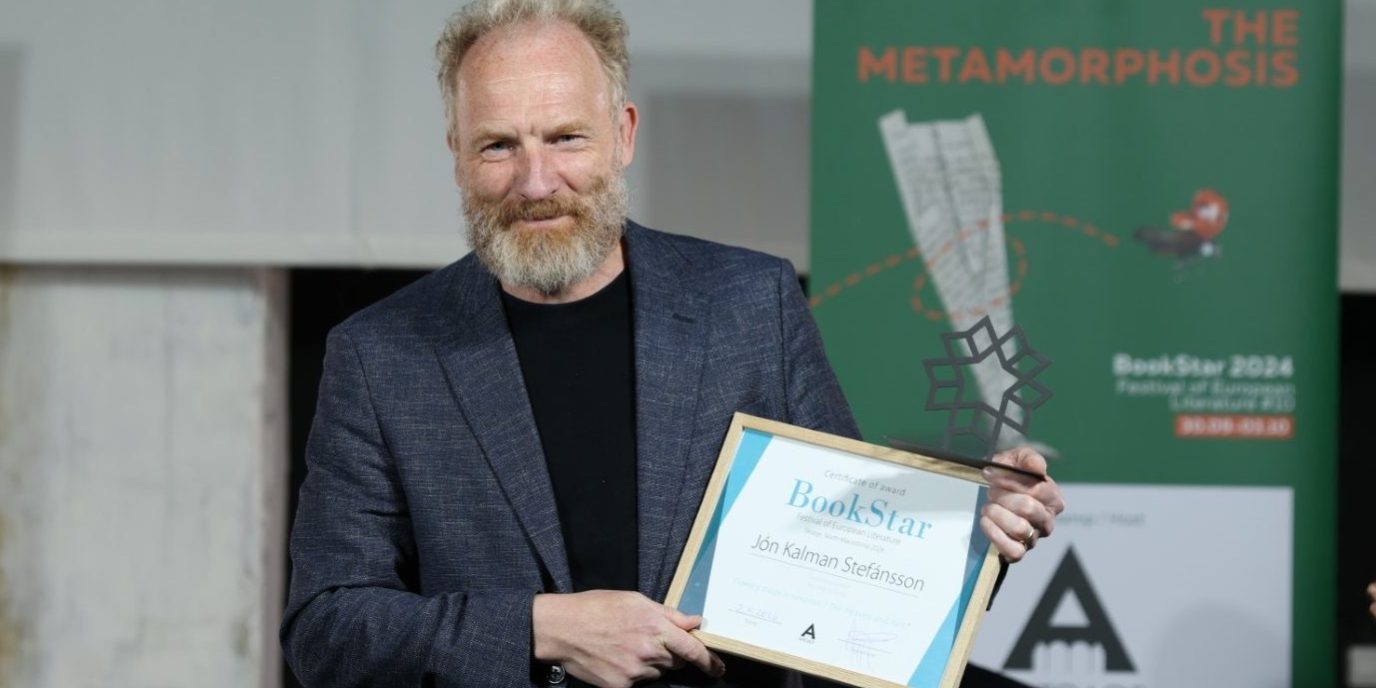2 октомври 2024, Скопје – Денес нè чека програмски најисполнетиот ден на годинашниот Фестивал „BookStar“, меѓу кои и свечното доделување на наградата BookStar 2024 на Јон Калман Стефансон од Исланд и концертот на Чалгија Саунд Систем а по повод двата јубилеја – 10 години „Букстар“ и 25 години „Антолог“! Денот ќе започне со „Книжевно отворање кон Европа – македонско искуство“ – значајната втора конвенција на претставници на издавачкиот сектор во склоп на програмата Publishing Europe Fellowship. Учесници ќе бидат Владимир Мартиновски, Билјана Туџаровска-Ќупева, Живко Грозданоски, Снежана Стојчевска, Тијана Милиќ, како и Надеж Агило (Франција), Џорџија Спадони (Италија), Тино Шленх (Австрија/Германија), Манол Пејков (Бугарија), Бенјамин Лангер (Германија). Настанот ќе се одржи на Филолошкиот факултет „Блаже Конески“ – Скопје, каде што одделни средби со студентите ќе имаат Мирженка Чехова и Паола Перети. На истото место во 12.30 ќе бидат соопштени и наградите за најдобар превод „Драги“ 2024, а во „Јуроп хаус“ во 16 часот ќе се одржи панел-дискусија „Читајќи го и преведувајќи го Кафка“ во чест на светското одбележување на стогодишнината од смртта на Франц Кафка. Учесници ќе бидат Зорица Николовска, Венко Андоновски, Соња Стојменска-Елзесер, Бенјамин Лангер (Германија), Јасминка Делова-Силјанова и Бобан Здравковски Андреевски. Следните настани ќе се одржат во „Лабораториум“. Душко Крстевски ќе го одржи поседниот поткаст „Гол ручек“ за ова издание со Игор Маројевиќ, а Александар Маџаровски ќе го води разговорот со Жозе Луиш Пејшото (Португалија) и Здравка Евтимова (Бугарија).
Awarding of the Bookstar Award 2024 to the Icelandic author Jón Kalman Stefánsson for the trilogy "Between Heaven and Hell" will be held at 8 p.m., and the conversation with him will be led by Aleksandar Madjarovski and Nikola Madjirov. The evening will end with the big concert called 10/25 by "Čalgija Sound System" which is open to the public.
Report from the other day
Ethnic, political, social, but also personal struggles in the works of a few Balkan authors were the central themes of the so-called "Balkan (K)nights", which took place last night in "Laboratorium" within the festival for European literature "Bookstar".
The conversation with the authors Kristian Novak from Croatia, Rumena Bužarovska from North Macedonia, Faruk Šehić from Bosnia and Herzegovina and Igor Marojević from Serbia, was led by Vladimir Jankovski.
The authors addressed topics such as the trauma resulting from the Yugoslav wars, while it also moves through the modern "war" between male and female narrative voices, critically considering gender dynamics in society, highlighting the ongoing struggle between traditional expectations and modern social perspectives, as well as battles with stereotypes. The works of these authors present a complex narrative that intertwines historical principles with contemporary gender debates, providing a multifaced view of the answer of ex-youth literature and the echoes of war and gender.
Bosnia and Herzegovina’s writer and journalist Faruk Šehić was a member of the fifth corps of the BH Army in the period 1992-1995. He was also seriously wounded once. He finished the war with the rank of lieutenant and was awarded for his skills. Afterwards he devoted himself to literature during the war. He writes poetry, prose, essays, art and literary criticism. The first published work is "Poems in the making" in which the war appears as the main motif. He transferred the lived experiences of the war to the collection of short stories "Under Pressure". This work, as well as "Hit Depot" and "Transsarajevo" acquired a cult status among the readership and everything issued in multiple editions.
– Тоа е поетска географија. Како што во еден филм што имаше реплика, кога еден лик го прашува другиот лик: Имаш ли воено искуство? Имам, одговара ликот. Па што можеш да направиш со тоа? Па така јас почнав со кратки песни, па со раскази. Војната влијае врз нас, и како што човекот старее, така и се менува. Апокалипса е она кога сѐ што било ненормално, одеднаш станува нормално. Како, на пример, кога човек ќе убие човек. Доаѓам од земја во која луѓето се постојано со иста мисла: Ќе има војна или ќе нема? Земја во која луѓето живеат во очекување. Сакав да пишувам за војната. Како мајстор што ги знае сите делови на автомобилот, така ја знам за војната. И сакав да ѝ ја доловам бојата, мирисот, вкусот. После војната сакавме да се вратиме онаму кајшто сме биле. Таа еуфорија траеше неколку години. Луѓето сакаа да ја надминат трумата, па заминуваа во Канада, Австралија. Сите војни повеќе или помалку се исти. Но во секој град војната е различна. Некогаш се прашуваме: Ако ја немаше војната, како би излгедало губењето? Како би изгледала траумата – изјави Фарук.
The Croatian writer, on the other hand, Kristian Novak, believes that there should not be no imperative in literature, and that everyone should write about what they want to write.
- I'm interested in the affairs of the individual, it's all about perception, not me they are interested in extremely good or extremely bad characters. I love them the characters who change, who undergo a transformation, who from a coward become a brave man. I'm interested in the man who makes a sacrifice and turns into something different from what he was until then - Novak said.
Serbian writer and translator Igor Marojević pointed out that the reader's the audience very often wants narratives that have a happy ending, but he can't to write about it.
- I prefer to write about negative poetics. And people love bestsellers, identify with them. I call it the terror of positivism. The people want a happy ending, to be given something positive. Thematically, I am not interested in that - said Marojević.
Marojević deals with topics for endangered minorities, that is, individuals who are faced with the aggressive society. His works have been translated into seventeen languages. He published the "Belgrade Book of Fridays" and is also the author of the pentology "Ethnofiction" of which four parts have been produced so far. His work "Nomads", original written in Spanish, it is performed in Spain in the production of the "Theatrical Barcelona Institute" and in the Belgrade Drama Theater. "Remnants of the World" is the most awarded novel in Serbian literature of the 21st century.
Jankovski also started the topic of creating a dialect, which is very often present the Croatian author Kristian Novak.
- You can't have a character from the village and for him to speak hypercorrectly, in the standard language. Characters should speak naturally, as people do in real life. I use the sociolects I insert to capture an emotion, I use the standard language to express my thoughts - emphasized Novak.
Macedonian writer Rumena Bužarovska also pointed out that it is a lot important to write in dialect.
– Во Хрватска тој тренд на пишување на дијалект е многу познат. Јас многу се израдував кога прочитав книга од Ненад Јолдевски на струшки дијалект. И посакав и други да пишуваат. Последната книга ми е речиси цела на скопски, зашто тоа е мојот дијалект, ја не би можела да пишувам на друг дијалект. Но многу е важно јазикот да биде автентичен – рече Бужаровска.
She pointed out that although she is aware that the book "My Husband" is her hit, still there are other much dearer books he has written such as “I'm Not Going Anywhere”.
Regarding the question of how she is perceived when she visits the world as a writer from the Balkans, Bužarovska says that although everyone sees her differently, what she is what they all have in common is that they perceive her as coming from a country that has passed through war.
- Outside the country, they perceive me differently everywhere. But there is one thing that is common to all: Everyone puts Macedonia in the war basket. Mostly when talking to me, they talk about it. If they don't tell me about that, then they tell me about ajvar, peppers, Gevgelija, nationalism. In America, they have no idea where I'm from, they think that I am from Europe and when I say that I am from Macedonia, they think that I’m forcing that. In Europe, on the other hand, they see me as someone who comes from a country that cannot enter in the European Union. In the Balkans, however, it happened once in my honor at a cocktail party to serve kebabs with beans and they played "Čukni vo drvo" and "Skopje" from "Leb I Sol". Sometimes I know how to make fun of them. I do not feel that I am in an inferior position for although we come from a country with a language of few speakers, we invested many things in us - said Bužarovska.
The second evening concluded with a literary stand-up performance by Marjan Georgievski, a during the day, a literary reading "Transformation(s)"/"The metamorphosis", at which several domestic and foreign authors presented themselves, author Paola Peretti from Italy will hold a creative workshop, and a podcast with Kristian Novak from Croatia and Jón Kalman Stefánsson from Iceland, was held by Duško Krstevski.
The festival is held under the slogan "The Metamorphosis" and is supported by the Ministry of Culture and Tourism of the Republic of North Macedonia, the literary network Traduki, EU with YOU, the Embassy of the Czech Republic and Republic of Italy, the Cultural and Information Center of the Republic of Bulgaria in Skopje, the Italian Institute of Culture in Belgrade, the Icelandic Literary Center and the "Camões" Language and Cooperation Institute. The media sponsor is the Macedonian Radio Television. The visual identity is the authorship of Maja Plačkoska, who also produced the festival video.
Follow us on:
Website
https://bookstar.mk/
Facebook
ANTOLOG - Publishing house
Instagram
@bookstar_festival
@antolog_mk
Youtube
https://www.youtube.com/channel/UCPMeZZYy8_NAAGJ4bUR3OeA

